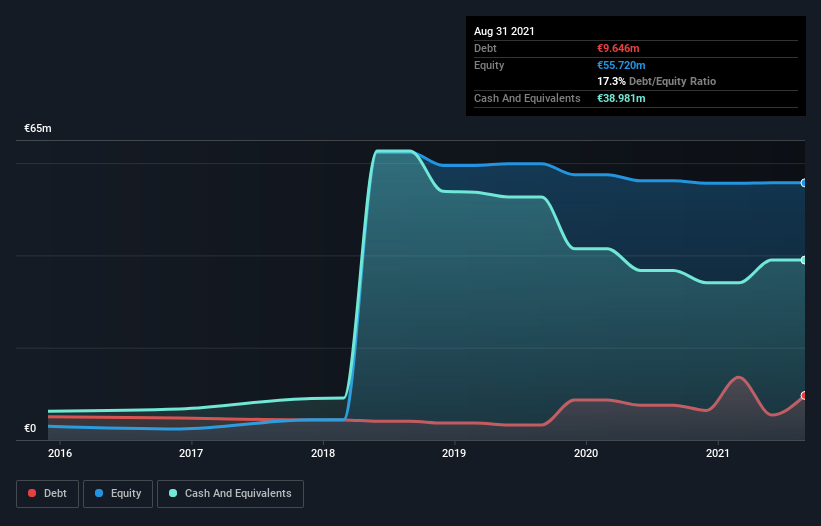The external fund manager backed by Berkshire Hathaway's Charlie Munger, Li Lu, makes no bones about it when he says 'The biggest investment risk is not the volatility of prices, but whether you will suffer a permanent loss of capital.' So it seems the smart money knows that debt - which is usually involved in bankruptcies - is a very important factor, when you assess how risky a company is. We note that Serviceware SE (ETR:SJJ) does have debt on its balance sheet. But the real question is whether this debt is making the company risky.
What Risk Does Debt Bring?
Debt is a tool to help businesses grow, but if a business is incapable of paying off its lenders, then it exists at their mercy. In the worst case scenario, a company can go bankrupt if it cannot pay its creditors. However, a more frequent (but still costly) occurrence is where a company must issue shares at bargain-basement prices, permanently diluting shareholders, just to shore up its balance sheet. Having said that, the most common situation is where a company manages its debt reasonably well - and to its own advantage. The first step when considering a company's debt levels is to consider its cash and debt together.
View our latest analysis for Serviceware
What Is Serviceware's Net Debt?
As you can see below, at the end of May 2021, Serviceware had €9.65m of debt, up from €7.53m a year ago. Click the image for more detail. However, its balance sheet shows it holds €39.0m in cash, so it actually has €29.3m net cash.

How Healthy Is Serviceware's Balance Sheet?
According to the last reported balance sheet, Serviceware had liabilities of €40.5m due within 12 months, and liabilities of €14.8m due beyond 12 months. Offsetting this, it had €39.0m in cash and €32.9m in receivables that were due within 12 months. So it actually has €16.6m more liquid assets than total liabilities.
This short term liquidity is a sign that Serviceware could probably pay off its debt with ease, as its balance sheet is far from stretched. Simply put, the fact that Serviceware has more cash than debt is arguably a good indication that it can manage its debt safely. The balance sheet is clearly the area to focus on when you are analysing debt. But ultimately the future profitability of the business will decide if Serviceware can strengthen its balance sheet over time. So if you want to see what the professionals think, you might find this free report on analyst profit forecasts to be interesting.
Over 12 months, Serviceware reported revenue of €81m, which is a gain of 13%, although it did not report any earnings before interest and tax. We usually like to see faster growth from unprofitable companies, but each to their own.
So How Risky Is Serviceware?
Although Serviceware had an earnings before interest and tax (EBIT) loss over the last twelve months, it generated positive free cash flow of €9.0m. So although it is loss-making, it doesn't seem to have too much near-term balance sheet risk, keeping in mind the net cash. We'll feel more comfortable with the stock once EBIT is positive, given the lacklustre revenue growth. The balance sheet is clearly the area to focus on when you are analysing debt. But ultimately, every company can contain risks that exist outside of the balance sheet. We've identified 1 warning sign with Serviceware , and understanding them should be part of your investment process.
Of course, if you're the type of investor who prefers buying stocks without the burden of debt, then don't hesitate to discover our exclusive list of net cash growth stocks, today.
New: Manage All Your Stock Portfolios in One Place
We've created the ultimate portfolio companion for stock investors, and it's free.
• Connect an unlimited number of Portfolios and see your total in one currency
• Be alerted to new Warning Signs or Risks via email or mobile
• Track the Fair Value of your stocks
This article by Simply Wall St is general in nature. We provide commentary based on historical data and analyst forecasts only using an unbiased methodology and our articles are not intended to be financial advice. It does not constitute a recommendation to buy or sell any stock, and does not take account of your objectives, or your financial situation. We aim to bring you long-term focused analysis driven by fundamental data. Note that our analysis may not factor in the latest price-sensitive company announcements or qualitative material. Simply Wall St has no position in any stocks mentioned.
Have feedback on this article? Concerned about the content? Get in touch with us directly. Alternatively, email editorial-team (at) simplywallst.com.
About XTRA:SJJ
Serviceware
Provides a portfolio of software solutions for the digitalization and automation of service processes in Germany, Austria, Switzerland, and internationally.
Flawless balance sheet with reasonable growth potential.
Market Insights
Community Narratives



